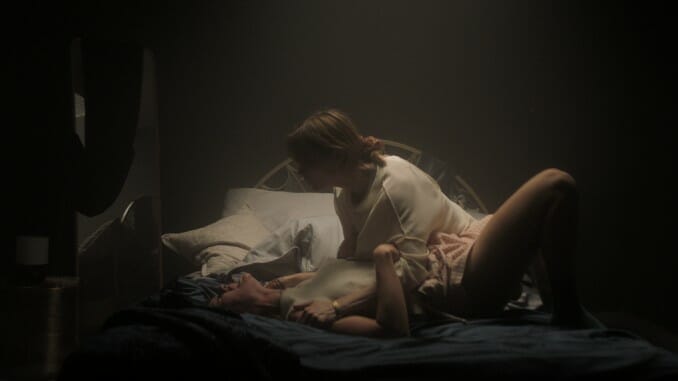A Banquet‘s Slowly Delivered Horror Arrives Cold

I’m confident some will find the arthouse ambiguity of Ruth Paxton’s A Banquet insidiously enthralling—unfortunately, that’s not my experience. It’s a film that learns the wrong lessons from A24-bred horror standouts and invests every cent into this “don’t show, don’t tell” application of sorrow. Justin Bull’s screenplay focuses heavily on two acts that seem to be building somewhere, then the credits smash as the third act fizzles away after reaching nothing but a simmer. Fans of quieter horror stories might devour the emotional trauma that meets a tepid possession arc. Still, it’s hard to comprehend A Banquet’s languishing pace—one made even more pronounced by such an unsatisfying finale misfire.
Sienna Guillory stars as Holly, a newly widowed parent left alone with daughters Betsy (Jessica Alexander) and Isabelle (Ruby Stokes). Holly’s invalid husband dies a particularly gruesome death—the bedridden husk of man swallows toxic chemicals and stains his household’s floor with vomit before expiring for Holly and Betsy to discover. Soon after, Betsy loses her appetite and cannot consume food without extreme convulsions. There’s no medical explanation for Betsy’s condition, except—as per her words—that she’s been enlightened and taken over by something unknown. Not exactly the reassurance a mother wants to hear.
A Banquet’s horrors are exquisitely maternal. Holly endures her own mother’s scolding glances while trying to do right for her inexplicably reprogrammed daughter. The fight between Betsy and Holly over stomaching a single oily pea for dinner is the best representation of their struggle—but narrative evolution never blossoms. Betsy isn’t eating, Holly continues to crack after the loss of her ill husband, and Isabelle fights her sister’s “infection.” Rinse and repeat. Everyone is seeking approval (answerless Holly, renewed Betsy), which becomes catastrophic under the guise of supernatural concerns only for so long.
-

-

-

-

-

-

-

-

-

-

-

-

-

-

-

-

-

-

-

-

-

-

-

-

-

-

-

-

-

-

-

-

-

-

-

-

-

-

-

-








































